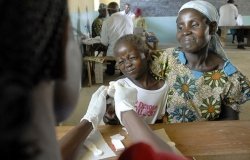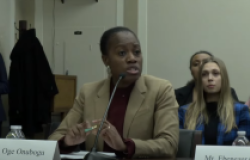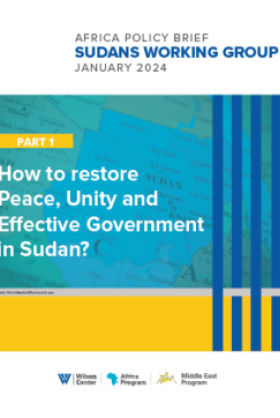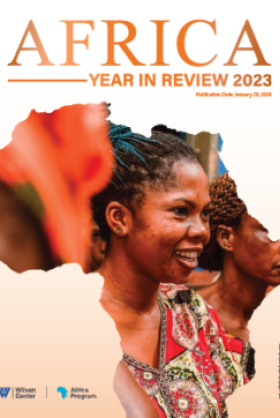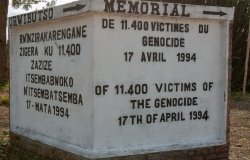Helping a Troubled Continent
The G-8 summit is focusing on Africa. Former Congressman Lee Hamilton outlines where the international community can make a difference.
When the Group of 8 industrialized nations (G-8) meets later this week in Scotland, the world's leading industrialized democracies will focus on Africa. Can the G-8 help lift Africa out of its morass?
Africa's problems are manifold. Poverty is rampant: half of Africans live on less than a dollar a day; Africa's share of world trade was cut in half between 1980 and 2002; 130 million children are not in school, and a third do not get enough to eat. Endemic diseases ravage the continent: life expectancy is 47 years and declining; six million Africans die every year of preventable and treatable causes; 26 million Africans have HIV/AIDS. Violence is also a plague: over 4 million people have died over the last decade due to a war in Congo, conflict rages in Sudan, Sierra Leone, Cote d'Ivoire and other places, and far too many African children are forced to become soldiers when they should be attending school.
Some people look at the continent's problems and shrug their shoulders; others make the mistake of trying to tackle every challenge at once. We cannot do everything in Africa, but doing nothing is not an option. Africa's condition confronts our sense of common humanity; threatens global peace, prosperity, health and environmental protection; and squanders unrealized potential. The challenge for the international community is focusing on the areas where we can make the greatest difference. Africa is a diverse continent with diverse needs; to make progress, priorities must be set.
The greatest need is for good governance. No amount of aid or good intentions can overcome the corrupt leadership that has plagued much of Africa. Too often, Africans have worked hard only to see their governments get in the way – through fraudulent use of aid, exploitation of natural resources for personal gain, or neglect of burgeoning crises like HIV/AIDS. Africa needs pragmatic leaders and strong laws – not strongmen rulers. International aid should thus be conditional on good governance, and the international community must bring pressure to bear on leaders who stand in the way of progress.
While reform must come from within African governments, international aid can make a difference. There are risks: that aid will be used inefficiently, crowding out exports or encouraging waste and corruption. But the greater risk is enabling the cycle of poverty, war, corruption and disease by doing nothing. A starting point is meeting humanitarian needs. For instance, mass distribution of bed-nets could save many of the thousands of Africans who die each day of malaria, anti-viral drugs are needed for Africans living with HIV/AIDS, and emergency food assistance can avert famine in the hardest hit areas.
International assistance must also promote long-term development. Aid should develop Africa's potential – putting more children in school, fighting disease, growing more food, and building roads, safe and clean water supplies, and other infrastructure critical to economic growth. Western leaders – including President Bush – are also poised to make a major contribution by forgiving some of Africa's crippling debts; even more important would be opening more western markets to African goods.
The G-8 should address conflict resolution. Violence terrorizes parts of the continent, impedes development, empowers dictators, and endangers American interests as terrorists and criminals find haven in the chaos of African wars. The international community can help mediate settlements, and provide resources and logistical support for international peacekeeping efforts in places like Sudan and Congo. It can also provide aid and training to build the capacity of national governments and regional organizations like the African Union to prevent conflict and keep the peace, thereby reducing the need for international interventions when alarm bells go off.
There is reason for hope. 43 of 48 sub-Saharan countries have held multi-party elections in the last decade. Natural resources, including oil and gas, are abundant. There are scattered success stories: South Africa's peaceful transition to pluralistic democracy; economic growth in countries like Ghana, Botswana, Senegal and Tanzania; Uganda and Senegal's success in combating HIV/AIDS with public education programs. Talented politicians, information technology, entrepreneurs, and a middle class are emerging, and American businesses are bullish on their future in Africa. An acknowledgment of the need for good governance within Africa is coalescing with renewed international determination to lift up a continent that has been left behind by globalization.
This week's G-8 summit will inevitably produce soaring rhetoric about the international commitment to Africa's future. Making rhetoric a reality will demand a new chapter of responsible governance within Africa, and support from the international community that is sincere, focused, and sustained.
Related Links
Related Program

Africa Program
The Africa Program works to address the most critical issues facing Africa and US-Africa relations, build mutually beneficial US-Africa relations, and enhance knowledge and understanding about Africa in the United States. The Program achieves its mission through in-depth research and analyses, public discussion, working groups, and briefings that bring together policymakers, practitioners, and subject matter experts to analyze and offer practical options for tackling key challenges in Africa and in US-Africa relations. Read more




